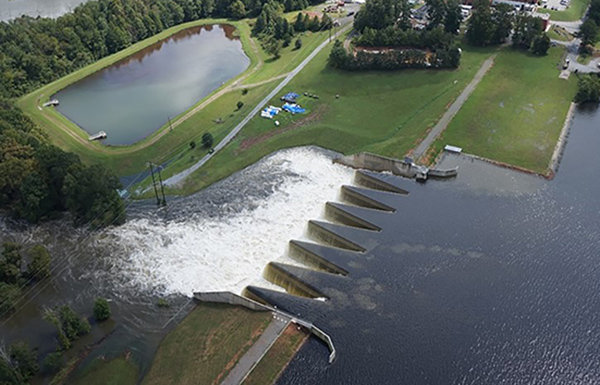Greensboro was actually pretty fortunate when it came to Hurricane Florence, we got a lot of rain but not the tremendous winds that cause massive damage and compared to the folks in Eastern North Carolina we didn’t even get that much rain.
However, all that rain has to go somewhere and although people who have been around for a while remember the droughts in the early years of this millennium, most people don’t think about too much rain causing problems for our water supply system, but it does.
Assistant City Manager and Water Resources Director Steve Drew said one of the difficult parts of managing water in a hurricane situation is that you have start making decisions seven days out when nobody knows which way the hurricane is going. But Drew said that while Florence was still hovering 150 miles off the coast, they started releasing water from the three lakes north of the city Lake Higgins, Lake Brandt and Lake Townsend that are the primary water supply for Greensboro. Water has to be released to make certain that there isn’t so much water flowing in that it can’t be released fast enough to prevent flood water from topping the dam. Or that is the problem at Higgins and Brandt the two smaller lakes in the system, but not at Townsend.
When you hear about unintended consequences, it’s usually something bad, but in this case the fact that Greensboro unexpectedly had to replace the Townsend Dam in 2011 made handling the massive amount of water headed our way a little easier. Most dams are designed not to have water flow over them, but the Townsend dam has a labyrinth design that looks like a row of saw teeth with the teeth getting progressively higher from one side to the other and is designed for water to flow over it. So the Townsend Dam can take a tremendous amount of water flowing over it, before it creates a problem and one of the main problems then is creating flooding downstream.
Even with this design the city released water from Lake Townsend in advance of the storm.
Lake Brandt is a more old fashioned dam and the wings to the north and south of the floodgates are earthen. If water tops an earthen dam you pretty much can write that dam off .
Drew said, “That actually happened at Lake Brandt in 1948 and they lost the dam.” Drew said that the old floodgates for the original Lake Brandt Dam are now buried under the mounds of dirt that form one of the wings.
Because the city was determined not to let that happen again Lake Brandt was taken down, before Florence.
And the preparations turned out to be necessary because during the 48 hours of Florence 11 billion gallons flowed through the lakes, when you consider the total capacity of the three lakes Townsend, Brandt and Higgins is 9.1 billion gallons that gives you an idea of the amount of water the folks in water resources were dealing with. It was like the lakes had been completely emptied and were then refilled to overflowing in 48 hours.
Drew said that in the past 20 years there have been more anomalous weather events than would be expected based on the data collected over the last 100 years and he expected that to continue. Drew said that while the standard for the industry is to be able to withstand a 500 year flood, the water resources department has also studied how to handle a 1,000 year flood.
Drew also passed along this piece of information that should make folks that worry, at least worry about something else. In the case of a catastrophic event where Greensboro lost electrical power, the water resources department could, without any fuel deliveries, provide water at the normal usage rate for at least two weeks using diesel pumps. If the tanks were full when the disaster struck it could provide water for a month and that is if no water restrictions were put in place.
Not only that but the wastewater treatment plant would also be in operation for two weeks to a month with no fuel deliveries.
So in Greensboro one thing you shouldn’t worry about is running out of water. If the disaster is so catastrophic that fuel can’t be delivered for two weeks, everyone will probably have a lot more to worry about than water.

